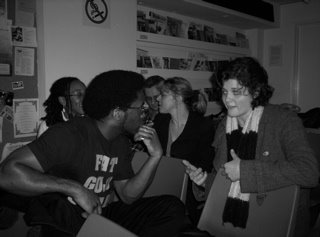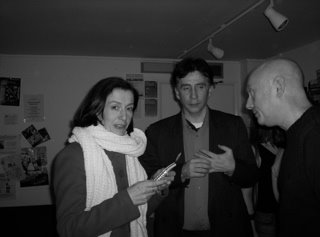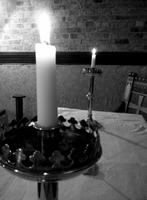Continuing my series of Sixth Birthday Celebration repeated blog posts from Raw Light's past, this post on my lost poem sequence, 'Umbra', is from January 2006.
One of the problems of working on computers is the thorny issue of when to back up, and what happens when you don't. I am extremely lax about backing up and have paid the price. Hundreds of my poems written between 1997 - 2004 are lost in the belly of the beast - i.e. inside one of my dead computers - and I have no idea how to access them and no funds available to engage the services of an expert on information retrieval.
One of the major victims is my long verse sequence UMBRA - later developed into a play for voices which was performed at Brasenose College, Oxford - of which only four poems still exist from about 40 in the original sequence. The rest are trapped inside a now defunct laptop which I was using while at Oxford. Having moved house five times since 1998, I have also managed to become separated from the paper copies of my older poems - where they existed at all. So unless they come to light at some point in the future, UMBRA is no more. No great loss, perhaps, to the literary world. But a part of my past which I would rather still have access to, if only for the pleasure of it.
So today I thought I'd post up a poem from UMBRA, and maybe the others that I have, slowly, in the coming days, to give them a little airing. They are certainly among the oddest poems I have ever written but they do deserve to be seen, I think. Indeed, the only reason I have these four poems at all is that they were published in the poetry magazine ‘Brando's Hat’ back in 1998, I think, and can be found at the Poetry Library website where they provide back issues of poetry magazines online. The rest are lost, probably forever.
UMBRA is a story told in poems - rather than a 'verse novel' - a storyline or theme developed through a sequence of poems.
The title character, Umbra, is a young woman who believes herself to be the reincarnation of Barton's wife, and feels drawn to take her place in his life. His daughter, Stella, feels threatened by Umbra whom she suspects of superseding her in her father's affections. Barton, who may or may not have murdered his wife, is both excited and disturbed by Umbra's sudden appearance. The sequence darts between the three voices, sometimes explorative, sometimes lyrical, often violent.
If there is a clear-cut theme in UMBRA - though I dislike having to discuss theme, which can be such a slippery thing for a writer - it's probably something to do with mental breakdown, with the odd disturbing shifts in personality that happen at that time, the inability to see oneself clearly, or as others see you, and the constant suspicion that your entire environment is somehow 'against' you, in a very real and threatening way.
This poem, 'Heaven to be out there, under', comes midway through the sequence and is unusual because it is written from the dead wife's point of view. She wants to communicate with her husband, to describe the experience of being dead, I suppose, but since the poem is told through Umbra's voice, it may not be entirely trustworthy. Umbra has begun to learn about and identify with the dead woman to such an extent that the boundaries between them begin to shift and blur from this point. Is she really the reincarnation of Barton's wife, possessing a direct mental link to the secrets and tragedies of his past, or is she simply mad?
Heaven, to be out there, under
she might have told him,
not rolling, but holding, taking
the thunder, a wild bird
into shelter, dredging the surf
of the storm, shimmying.
Hell, to be in here, realised,
torn to a stand, stripped
of these leaves, these coverings.
A cold hand summons the star.
Warm breath mists the mirror,
repeating the winter,
the dead season, where I
reel from the whirlpool,
the sucking in, the bright mote.
N.B. This is the first - and only - poem in which I have used the word 'mote' (speck of dust) more commonly associated with poor imitations of nineteenth century verse. Personally, my eyebrows shoot up whenever I encounter it in contemporary poetry, yet here it seems natural. To me, that is. You may disagree.
Showing posts with label 6th birthday celebration. Show all posts
Showing posts with label 6th birthday celebration. Show all posts
Monday, October 03, 2011
My 'lost' poem sequence, 'Umbra'
Labels:
6th birthday celebration,
poems,
Raw Light Repeats
Sunday, September 25, 2011
On Angels and Muscular Poetry
Continuing my series of Sixth Birthday Celebration repeated blog posts from Raw Light's past, this odd little post is from Christmas 2005:Several days have passed since I last updated my blog ... and no surprise there, with Christmas-a-coming and five kids in the house!
I was also struck down by one of these mystery bugs over the weekend and ended up sweating it out under a duvet on the sofa. Shades of being ten years old again and being allowed to watch telly for hours. Except now it’s the DVD collection of ANGEL I’m watching.
I only discovered BUFFY a couple of years back, having married a serious sci-fi/fantasy/horror fan, and now I have the pleasure of steadily watching my way through both BUFFY and ANGEL on DVD, courtesy of the incredibly good value home rental system on amazon. I find both highly entertaining. Especially when laid low and in desperate need of some eye-candy, as the Americans would put it. I’m referring, of course, to the sultry David Boreanaz, who plays Angel, the vampire with a soul.
So, I did my Fourcast reading at the Poetry Cafe last week and it went very well. I was nervous up until the last minute, then found it easy to slide back into performance mode. The poems I read were all new, i.e. uncollected, and some were so new they haven’t yet found their way into any magazines. I was very impressed by Martina Evans, Kevin Higgins and Jacob Sam-La Rose, the other poets reading with me that night, and it was good to see Roddy Lumsden again, who was hosting the event.

Jacob Sam-La Rose
My thanks to my husband Steve, who stoutly accompanied me down to London even though it meant he didn’t get to bed until nearly 3am and then had to get up for work again at 7am, and to my oldest and dearest friend Judy Ewart, who bought my train ticket, bless her, sat through the reading and then did something almost unheard-of at such events, and actually bought books by the other poets there. With hard cash!

Martina Evans and Kevin Higgins (first from the left)
Yes, it was an enjoyable and fruitful evening; I’ve found that reading poems to an audience is essential for testing them on the air. Otherwise you’re only hearing the poems inside the space of your own head, or as a private exchange between yourself and maybe your partner or husband or cat, whoever happens to be listening when you first try them aloud, and it can be harder to spot glitches in the rhythm or words which don’t fit as perfectly as they should. So it was a useful exercise and I did take away some thoughts on possible structural changes to the more recent poems. I also noted which poems seemed to ‘grip’ the audience more than others.
To my mind, no sin in a writer is greater than that of boring the reader or listener. So it’s a relief to find a poem within your repertoire that, like a good and trusted friend, can be relied upon in almost all circumstances: a muscular poem with broad shoulders and, even better, deep pockets.
Saturday, September 24, 2011
The Death Instinct: from November 2005
Continuing my reposting of old blog posts to celebrate six years of blogging here on Raw light, this poem-post comes from November 2005:
When I first started this blog, I thought it would be nice to post up some poems from time to time, but never really got around to managing that. But being deeply involved with a new novel at the moment, it seems a quick way of keeping the blog active without having to bare my soul online.
This isn't a new poem but it is one of my personal favourites. I wrote THANATOS in about 1998; it was published a year or so later in PN Review, an intelligent poetry magazine edited by Michael Schmidt of Carcanet Press (PN stands for Poetry Nation). Since my second collection is still forthcoming, it has not yet been published in book form.
[This poem appears in 'Boudicca & Co.' now available in paperback or Kindle edition. Jane]
It's never easy for a poet to 'explain' a poem they have written, but THANATOS, I suppose, is a poem which likens love to being caught in a cyclone. It's quite different from the poems in my first collection, most notably in terms of form; I'd been reading some of Ted Hughes' later work when I wrote this - his BIRTHDAY LETTERS, in particular - and I was rather taken with the prosiness (which I'm not convinced is a real word) and dramatic tone of that collection.
Thanatos comes from the Greek for death. I think it means something like 'death-instinct' - at least, that's what I took it to mean at the time I wrote this poem. Later, I agreed to medication and am no longer driven to write this sort of grim, self-involved poetry. I'm not sure if that's entirely a good thing. I prefer compulsive poetry to light anecdotal verse, and it's quite hard to write poetry of a compulsive nature when everything's sunny in your life and you're not struggling with some terrible inner demon. Though I imagine there are many poets out there who would - and probably will - disagree with that particular generalisation. Fortunately, I don't care.
THANATOS
Schoolgirl vulnerable, still smarting from
the fumbled mismatch of a love affair, I fell
straight out of space and into hell
that night. He was only a voice
on the edge of nothing, but I kept returning
to him, flickering like a stilled film
against the mindless black ferocity of wind.
The roof was trying to suck me out, vast mouth
clamped like a mad baby’s over the breast
of a house, whining for milk. I wanted
then to loose my hold, know how it feels
to spiral in the infinite, to Catherine-wheel
across the space that once was love.
Thanatos, pricking at my blood: the truth
that I came searching for, a weariness
that threatened to unclasp my hand, saying
it’s over, all over, why resist?
But at the other end of light, the funnelled dark
was a dead body I clung to out of
sheer stubbornness.
And the black wind
could not dislodge me from my welding-place,
though its eye bent in and saw me there,
plucked at my white knuckles, severed
the electric umbilical of light. I took
that place and hid it underneath the other times,
less brutal, more arranged. But it comes back,
obliterates that flash between dark and dawn,
and I pretend not to recognise it; call it
desire for solitude. Expurgate, disown the truth.
Labels:
6th birthday celebration,
depression,
poem,
RawLightRepeats,
Ted Hughes,
thanatos
Friday, September 23, 2011
Reading Thomas Wyatt: a post from October 2005
Continuing in my series of Sixth Birthday Celebration Repeat Postings, here is a post which has proved consistently popular with browsers since it first appeared on October 3rd, 2005. Seems there are quite a few Wyatt fans out there ...

A Tudor moment, with a glance at Whoso list to hunt (whoever chooses to hunt). This sonnet by Thomas Wyatt (1503-1542) is a personal favourite of mine. It's a loose translation of Petrarch but entirely Wyatt's own, possibly written about a clandestine affair he's reputed to have had with Anne Boleyn, speaking across the centuries of frustrated love, impossible love, love at a distance.
A hind, of course, is a female deer.
Whoso list to hunt, I know where is an hind,
But as for me, alas, I may no more.
The vain travail hath wearied me so sore,
I am of them that farthest cometh behind,
Yet may I by no means my wearied mind
Draw from the deer, but as she fleeth afore
Fainting I follow. I leave off therefore
Since in a net I seek to hold the wind.
Who list to hunt, I put him out of doubt,
As well as I may spend his time in vain,
And graven with diamonds in letters plain
There is written her fair neck round about:
Noli me tangere for Caesar's I am,
And wild for to hold though I seem tame.
Noli me tangere = Do not touch me (poachers of the king's deer could expect the death penalty - as could poachers of the king's wife!)
This modern version of Whoso list to hunt comes from Hardiman Scott's edition of Wyatt's Selected Poems, which is published by Carcanet Press. Here's the back cover copy for those who'd like to know more.
Sir Thomas Wyatt (1503-1542), 'the first great English lyric poet', remains one of the most popular writers of Henry VIII's court, and perhaps the most romantic, given his entanglement with Anne Boleyn, which resulted - legend has it - in some of his most passionate and vulnerable poems. This book contains a representative selection of the work: all the best-loved poems and many lesser-known pieces which illuminate a complex and sophisticated sensibility. Hardiman Scott sees Wyatt as a modern poet before his time and demonstrates the impact he and his younger contemporary the Earl of Surrey had on the development of English poetry. Wyatt introduced the sonnet, terza rima and other Italian verse forms into English, and invented forms and processes of his own.
For those trying to remember the other much-anthologised poem by Wyatt, try this link to an online copy of his superb 'They flee from me that sometime did me seek'. More on Wyatt on this blog too, in an October 2007 entry.
Labels:
6th birthday celebration,
Anne Boleyn,
RawLightRepeats,
Thomas Wyatt,
Tudor poetry,
whoso list to hunt
Subscribe to:
Posts (Atom)
